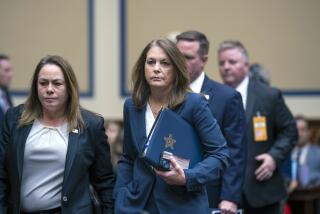White House accepts some blame for dinner crashers
- Share via
Reporting from Washington — The White House said Wednesday that its staff “did not do everything” it could have to help secure the president at a state dinner last week -- the first public acknowledgment that it shared the blame for a pair of uninvited Virginia socialites attending the gala.
“We can do more, and we will do more,” Deputy Chief of Staff Jim Messina wrote in a memo circulated to the media.
As the White House was issuing its mea culpa, it also was shielding the official in charge of the lavish event. White House Press Secretary Robert Gibbs confirmed Wednesday that Social Secretary Desiree Rogers would not testify at a congressional hearing today on the incident. “I think you know that based on separation of powers, staff here don’t go to testify in front of Congress,” Gibbs told reporters.
Rep. Peter T. King (R-N.Y.), the lawmaker who initiated Rogers’ invitation, called the White House’s decision “stonewalling.”
“This really shows an arrogance of the administration toward Congress on an issue of great national importance: the security of the president of the United States,” he said.
Late Wednesday, a publicist for Tareq and Michaele Salahi said in a statement that the couple would not testify either, the Associated Press reported. That prompted the chairman of the committee, Rep. Bennie Thompson (D-Miss.), to threaten to subpoena them.
The couple has claimed that the whole incident was a misunderstanding and that they were unfairly being painted as gate-crashers.
Messina’s finding followed an internal review of how the Salahis were able to get past security -- even pose for pictures with Obama and Vice President Joe Biden -- without being on the guest list. The memo did not mention specific failings or people involved, but detailed a series of policy changes for White House events, including the posting of White House staff at all checkpoints.
For days the White House had insisted that it would have made no difference had an aide been posted at the checkpoint used by the Salahis. The White House said that responsibility for the breach rested with the Secret Service.
But the internal inquiry found that the White House also was at fault, Messina wrote.
“After reviewing our actions, it is clear that the White House did not do everything we could have done to assist the United States Secret Service in ensuring that only invited guests enter the complex,” the memo read.
E-mails made public Tuesday showed that the Salahis made considerable effort to secure an invitation to the event, held for India’s prime minister.
The e-mails show that Michele S. Jones, a special assistant to the secretary of Defense and a White House liaison, told the Salahis that she was trying to help them. She had collected Social Security numbers for a security clearance, and had told the couple that they might be allowed into an early reception that later was canceled. When she delivered the bad news, the Salahis were en route to the party, according to an e-mail from Tareq Salahi.
The Secret Service has said that it is investigating whether the Salahis committed a crime in gaining admission. Legal experts said the e-mails might bolster their defense.
“It’s no longer such a clear-cut case,” said Duke University law school professor Sara Sun Beale, noting that the case would hinge on whether the Salahis knowingly lied to the Secret Service.
Making false statements is a felony punishable with up to five years in prison and a $100,000 fine.
“It all depends on what was said at the gate. If they left a few things out, or said something mushy, it’s not clear it would be a false statement,” Beale said.
The vice president told NBC’s “Today” show Wednesday that during the party, he did not know who the Salahis were, although he assumed that they were “part of the social fabric of Washington.”
“They acted like they knew everyone in the room,” Biden said.
kathleen.hennessey@
latimes.com
Peter Nicholas in the Washington bureau contributed to this report.
More to Read
Get the L.A. Times Politics newsletter
Deeply reported insights into legislation, politics and policy from Sacramento, Washington and beyond. In your inbox twice per week.
You may occasionally receive promotional content from the Los Angeles Times.











